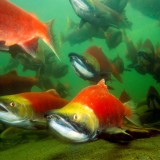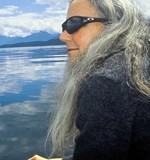Dear John Weston, MP,
A short time ago you held a meeting in Lions Bay to announce that through your sterling work and doggedness we will soon have a National Health and Fitness Day…or is it a whole week? Well done, I’m sure.
The thought may occur to some that this is a little dollop given to backbenchers to see that they are busy little bees and not doing the devil’s work like raising real issues that concern an MP’s constituents and home province.
I invite you to answer a few questions on the minds of, dare I say, most British Columbians who want you to listen to them, then take a public stand. I certainly understand, as I’m sure most people do, the need for party solidarity under our system. This must, however, surely take a back seat to forthright and courageous deeds when the very essence of your constituency and province are at issue as they are in BC today. The Harper government, with steady support of the Victoria Liberals, have implemented policies that will destroy us.
Do you know that Enbridge, which wishes to construct a 1,100 km twin pipeline through our northern wilderness, averages a spill a week? That they’ve had hundreds of spills over the past decade?
Do you know that the pipeline traverses the Rockies, then the Coast Range, thence through one of the most important and beautiful wilderness areas in the world?
Do you know that bitumen, the substance being transported, is different than conventional crude oil in that it is virtually impossible to clean up and that it has a “shelf life” of 100 years? That its viscosity means it clings to everything it touches? Have you studied the Enbridge spill into the Kalamazoo River, a location easy to access, and seen that two years later what the company described as ”not a major spill” has not been cleaned up yet and likely never will?
Have you done your thinking and reasoned that pipelines in this region would produce spill after spill in terrain that even a helicopter would have trouble getting to?
Have you examined the tanker traffic issue carefully or, indeed, at all? Do you not accept the fact that despite all efforts, there will be a spill? That bitumen, unlike regular crude, sinks like a stone? That where ordinary crude can be surrounded by rafts, closed in then scooped up, that bitumen sinks and, thus, for all intents and purposes, can not be recovered?
Have you ever been to Douglas Channel and assessed the challenge to a tanker? Do you not know that double hulling, while helpful, scarcely solves the question of human error, nor does it remove the certainty of a spill which will make the Exxon Valdez look like a non-event? That in recent years there have been four major accidents with double hulled tankers on within the last year and that these were collisions with other ships?
Do you not realize that the Kinder Morgan line poses a huge threat to the Port of Vancouver and entire south coast, much of which you represent?
John, your government has just approved, through the notorious Bill 38, of the rape of fish habitat. Because you voted for it you must have approved this monstrous act. That, for example, salmon spawning rivers are now all but unprotected? Do you not understand The Pacific salmon and their habits? Did you know, for example, that Coho spawn in creeks and ditches, and that Municipalities often approve development in the area because they’re told the creek or ditch has no fish values?
One day you should go down to the Musqueam Nation and look at Musqueam Creek, where I fished when I was a boy, and see that thanks to the Band it still has a Coho run. It’s a tiny creek, yet is very important as are other small streams throughout the province.
I close with this question: didn’t we send you to Ottawa to represent us and work on our behalf? Don’t we have the right to expect you to fight our battles in public, not tamely accept huge and permanent damage to your province? Why do we need you – to look after late pension cheques and send birthday cards to elderly constituents?
In reality, you clearly put your duty to your leader and your party ahead of your obligations to fight our battles and you might just as well be a fencepost with hair.
John, you support fish farms, support the BC government’s raping our rivers (indeed you’ve given grants to these bastards), you support legislation to all but eliminate federal protection of fish habitat, you approve of the environmental desecration of our salmon spawning grounds, pay no attention to the sure carnage which will, as night follows day, destroy our God-granted environment if pipelines and tanker traffic are approved.
Come to think of it, John, just what the hell have you done for our constituency? More importantly, what have you and your fellow Tory lickspittles done to save our province from being environmentally trashed by your corporate friends?
I’m reminded of Oliver Cromwell’s words to the Rump parliament: “You have sat too long for any good you have been doing lately…Depart, I say; and let us have done with you. In the name of God, go!”






